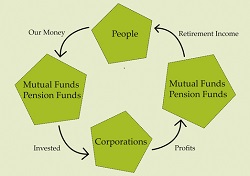|
People, Profits, & Pensions |
|
Teachers & Hogs
Friday, February 14, 2014 The 303,000 active and retired members of the Ontario Teachers' Pension Plan own a significant stake in Harley Davidson, 44,153 at the close of trading on December 31, 2013 (figures from nasdaq.com). And ownership makes heart grow fonder today, because on Monday the stock goes ex-dividend. That means today is the last day in which an owner is eligible to receive the company's quarterly dividend. Each share will receive a 27 and a half cent payment (scheduled for March 7, 2014). Assuming Ontario teachers still own 44,153 shares, we can multiply that number by $0.275 and see they will receive $12,142 for this quarter. Annualized, that's $12,142 x 4 quarters = $48,568. According to nasdaq.com, about 83% of this company's shares are owned by institutional investors; think pension funds and mutual funds.
The Bigger Picture:Will Profits from Big Macs Add to Your Retirement Income?In 1948, the McDonald brothers redesigned and remodelled their drive-in restaurant in San Bernardino, California. Taking inspiration from Henry Ford's assembly-line, they created the fast food revolution, with the quick service and low prices we now take for granted. In that same year, the U.S. National Labor Relations Board ruled unions could include pension issues in contract negotiations. That ignited a massive expansion of pension plans. In the 1950s, pension funds started buying stocks, rather than just bonds or their equivalents; in addition mutual funds came of age. With these two developments working, middle class people became owners of big business. At first, their stakes were modest, but steadily growing. And in just a few decades, they gained controlling interests in many large corporations through their funds. Management guru Peter Drucker has called it, "...one of the most startling power shifts in economic history." Now, working people reap the benefits of those investments, collecting much of the profit distributed by McDonald's and other big corporations. Discover how the pieces fit together. In Big Macs & Our Pensions: Who Gets McDonald's Profits? - a new booklet -(about 25-pages), you will:
You may not be among the owners of McDonald's. But if you belong to any pension plan, or contribute to a mutual fund or whole life insurance policy, you likely own pieces of some big corporations. More importantly, though, your retirement income will be bigger and grow more dependably than you would otherwise expect. Big Macs & Our Pensions: Who Gets McDonald's Profits? is now available at Amazon.com
|

The Ownership Cycle
Copyright 2014. Robert F. Abbott, All Rights
Reserved.
|

 By: Robert F. Abbott, author of
By: Robert F. Abbott, author of  It's Valentine's Day, and we're celebrating unexpected relationships. Today, we focus on teachers
in the province of Ontario (Canada) and the maker of hogs, Harley Davidson.
It's Valentine's Day, and we're celebrating unexpected relationships. Today, we focus on teachers
in the province of Ontario (Canada) and the maker of hogs, Harley Davidson.